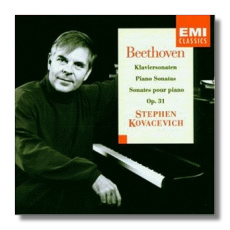
The Internet's Premier Classical Music Source
Related Links
- Beethoven Reviews
- Latest Reviews
- More Reviews
-
By Composer
-
Collections
DVD & Blu-ray
Books
Concert Reviews
Articles/Interviews
Software
Audio
Search Amazon
Recommended Links
Site News
 CD Review
CD Review
Ludwig van Beethoven

Piano Sonatas
- Sonata #16 in G Major, Op. 31/1 (1802)
- Sonata #17 "Tempest" in D minor, Op. 31/2 (1802)
- Sonata #18 in E Flat Major, Op. 31/3 (1802)
Stephen Kovacevich, piano
EMI 55226


- Sonata #27 in E minor, Op. 90 (1814)
- Sonata #28 in A Major, Op. 101 (1816)
- Sonata #32 in C minor, Op. 111 (1822)
Stephen Kovacevich, piano
EMI 54599
Let me put the cards on the table at the outset and say that it has been a long time since I enjoyed reviewing music this much. On the other hand, this essay is not a review in the technical sense of the word. If you are reading it hoping to glean new insights to these works, well that might happen, but don't bank on it. If you expect definitive recommendations, read elsewhere. In all honesty, this essay is more reporting than reviewing. I am sharing my experiences, in many cases, as I come to these works new. What I can say is that these recordings were the ones that made me want to learn more about the Beethoven Piano Sonatas. At one time, I had all of the works on LP with Schnabel playing. Frankly, I didn't care for them then, and I am not sure how I would respond today. If that disqualifies me from "knowing what I am talking about I have just saved you a lot of time. What I know is that I have already listened and relistened to Kovacevich's recordings. Each time I have listened to them I have learned more, appreciated more.
When I listen to Beethoven's Piano Sonatas, I am not sure what to think of them. Sometimes, like in the case of the Hammerklavier, I can't figure out what all the fuss is about. Why is this said to be, by some, one of the greatest works for piano? Maybe someday I will hear why. Still, I find the sonatas to be works that keep calling me back for more study…like there is something there I want to find.
I do have other Beethoven Sonata recordings in my collection. I mentioned Donohoe, but also have Plentnev and Brendel as contemporary comparisons. In addition there is Rubenstein and Solomon (I prefer the latter) but that is about like comparing apples and onions. Let me say, that while I cannot make A/B comparisons in every case, I have found that Kovacevich is continually involving, surprising, delighting in his playing. In the other performers I find my attention wavering at times.
One of the things about the Beethoven piano sonatas is that it seems like the pianists fall into one of two categories. One hears the piano as a percussive instrument, the other hears it more poetically. Beethoven is one of the most accessible "cerebral" composers. The trick is to convey Beethoven as more than a deaf, piano-pounding artist. The trick is to convey Beethoven as 'emotional intelligence', to borrow a phrase now current in many fields. This is what Kovacevich does for me.
There seems to be a partnership between his hands as he plays the sonatas. Inside the jewel case for the disc containing #28, next to it I scrawled, "a kiss between hands." That is, in some pianists I hear the right hand or left dominating the sound picture. In Kovacevich, much like another of my favorites, Firkušný, it is an equal partnership. Anyway, the 28th is one of the sonatas I just happen to have another recording of in my collection, also on EMI, with Peter Donohoe playing. As I compared the two, Kovacevich just seems to find more music in the notes, there is more happening in his performance. Now, I almost wrote that this could be the fault of the recording. But, I happen to know that many performers pass judgment on the released recording. So, if the problem is in the recording, it is still the result of the performer's decision. If the performer has no say in what is released on the recording, why is he bothering?
Kovacevich continuously impresses me as having just the right touch. He treats the piano as an instrument that is not percussive but he still has the precise attacks that are one of the fingerprints of Beethoven. There is, that is, clarity and warmth at the same time. As a point in case, let me discuss "The Tempest". I happen to have an older recording of this by Sviatoslav Richter on EMI 69032 (coupled with the Beethoven "Triple" Concerto with Richter, Oistrakh, Rostropovich and Karajan) I have had for years. The difference is apparent from the first minute. After a soft, mysterious opening, there follows a flurry of notes. Richter's touch here sounds out of character with the music, almost a parody. Kovacevich's approach is more melancholy, fitting the supposed nature of the work (Beethoven did say, when asked by Schindler what it meant, "Read Shakespeare's The Tempest.")
A digression: The Tempest is one of Shakespeare's last plays. It is a romance filled with mystery and magic. It opens with a tempest at sea resulting in the ships being sunk and the passengers 'stranded' on some strange place. I do not want to make too much of this, but it seems that Richter plays the whole thing in the nature of the title and misses the mystery, romance, and magic. Richter does not quite pound it out, but he has a much heavier fingering which imbues the piece with a sense of anger. It is true that this piece was written at a time in Beethoven's life when he was confronting the inevitable loss of hearing. It is true, but in Kovacevich's interpretation there is not so much anger as an underlying frustration. But then Kovacevich brings out the rest of the music. It is as if Beethoven was talking about struggling against his increasing deafness and insisting that he would create music just the same. And this is the strength in Kovacevich's interpretations. They are always musical. The Adagio sent chills up my spine.
Listening to this sonata for about the tenth time since I began this project, I appreciate Beethoven more and more. As I said in the opening, in the past I wondered what all the fuss was about these works. Well, now I am learning. Kovacevich seems to love playing Beethoven's Sonatas and he conveys that love in the attention to detail as in his delicate fingering like filigree on a wonderful tapestry. If you want to "get into" the Beethoven Sonatas I can certainly recommend this as the place to start. If you already have these in your collection I would suggest that you should make room for this set.
I can't wait to hear what Kovacevich does with the ones I am most familiar with. Perhaps now I'll hear what all the fuss is about the Hammerklavier.
Copyright © 1995, Robert Stumpf II


















